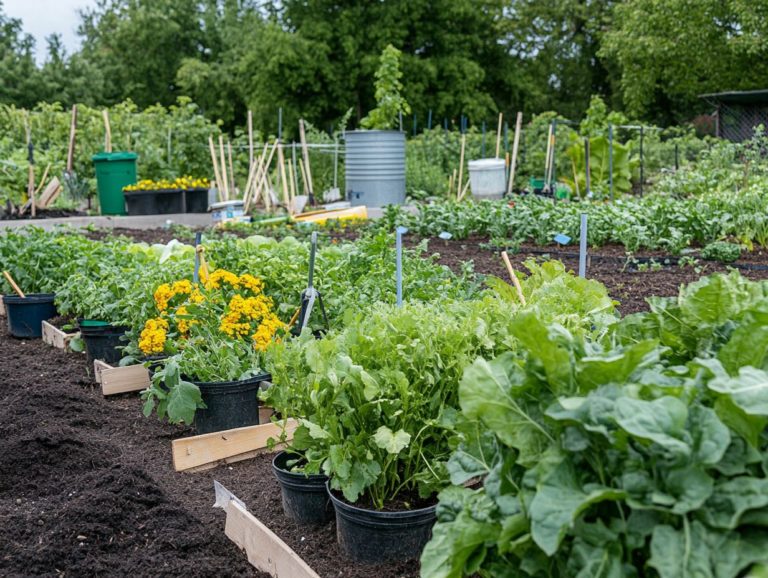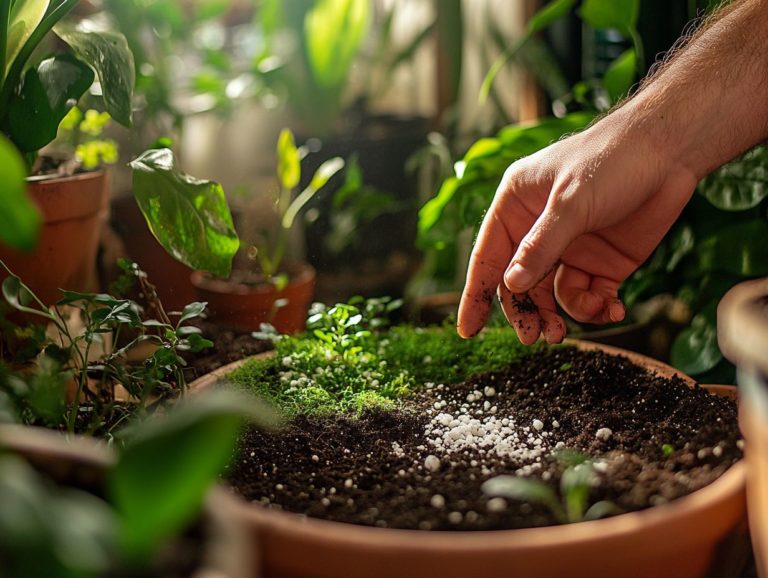Understanding the Role of Organic Matter
Soil organic matter is essential for maintaining healthy soil and fostering vigorous plant growth.
It is vital for gardeners and farmers to understand the different types and benefits of organic matter. This article delves into the definition of organic matter, explores its various sources both natural and synthetic and presents effective methods for enhancing the organic content in your soil.
You’ll also find insights into the broader environmental implications, including how organic matter can play a role in combating climate change. Explore how organic matter can transform agriculture and benefit our planet!
Don’t miss out on the incredible benefits that organic matter offers for a sustainable future!
Contents
- Key Takeaways:
- What is Organic Matter?
- The Importance of Organic Matter in Soil
- Sources of Organic Matter
- How to Increase Organic Matter in Soil
- The Role of Organic Matter in the Environment
- Frequently Asked Questions
- What is organic matter dynamics and why is it important?
- How does organic matter content benefit soil health and agricultural sustainability?
- How does organic matter affect the environment by helping nutrients flow and maintaining soil properties?
- What are the sources of organic matter?
- How can I increase the amount of organic matter in my soil?
- What are the risks of not having enough organic matter in soil?
Key Takeaways:

- Organic matter is the decomposed remains of plants and animals that provide essential nutrients for plant growth and improve soil quality.
- The presence of organic matter in soil promotes healthy plant growth and helps to mitigate the effects of climate change.
- Incorporating organic matter through methods such as composting and cover crops is crucial for maintaining healthy soil and a sustainable environment.
What is Organic Matter?
Organic matter is an essential element of soil that profoundly impacts a range of soil properties, such as structure, nutrient cycling, and moisture retention. It mainly consists of decomposed plant residues, microorganisms, and humic substances, and plays an important role in sustaining soil health and fertility.
Organic matter consists of two parts: the active organic fraction and stable organic matter, which together enhance soil productivity and foster ecological balance. Grasping its characteristics is crucial for implementing effective soil management practices that promote agricultural sustainability and soil conservation.
Definition and Types
Organic matter divides into two primary categories: the active organic fraction, which breaks down easily and provides immediate nutrient release, and stable organic matter, which endures over time and enhances soil structure.
Understanding these distinctions is crucial for appreciating the roles they play in nutrient cycling within ecosystems. The active organic fraction encompasses readily decomposable materials like green plant residues, kitchen scraps, and animal manures. These components decompose swiftly, releasing essential nutrients such as nitrogen and phosphorus into the soil, vital for robust plant growth.
On the other hand, stable organic matter is made up of well-decomposed, complex materials like humus. This type of organic matter significantly improves soil aeration, moisture retention, and biological activity. Organic feedstocks, like composted plant materials or manure, not only boost soil fertility but also foster diverse microbial communities, promoting sustainable agricultural practices and enhancing the overall health of ecosystems.
The Importance of Organic Matter in Soil
Organic matter is essential to your soil’s health, acting as a reservoir for the nutrients that support plant growth and ensure agricultural sustainability. It enhances vital soil properties, including cation exchange capacity, soil aggregation, and moisture retention, all of which are crucial for maintaining soil fertility.
The dynamics of organic matter significantly influence microbial activity and the overall biological function of your soil ecosystem, thereby contributing to effective nutrient cycling and erosion control.
Benefits for Plant Growth

The presence of organic matter in your soil is essential for elevating its fertility. It facilitates nutrient release and improves moisture retention, both critical for robust plant growth.
When organic matter decomposes, it releases vital nutrients like nitrogen, phosphorus, and potassium, making them readily accessible to your plants. This not only enhances nutrient availability but also improves soil structure, allowing for better air and water movement. Increased moisture retention enables your plants to endure drought conditions with greater resilience.
For example, in areas where farmers incorporate compost or cover crops into their practices, they often witness significant boosts in crop yields.
Healthy soil, enriched with organic matter, supports a diverse microbial community. This fosters an ecosystem that promotes overall plant vigor and growth.
Impact on Soil Quality
Organic matter significantly improves soil quality. It enhances soil structure, improves erosion control, and nurtures a vibrant ecosystem of tiny creatures that live in the soil that support moisture retention.
By binding soil particles together, organic matter creates stable soil aggregates. This stability makes your soil less compacted and more alive! It promotes better water infiltration while enhancing soil moisture-holding capacity.
This improved structure curbs nutrient runoff and encourages beneficial microbial activities that are vital for maintaining soil health. Integrating organic matter into your soil management practices acts as a place where nutrients are stored. This ensures that plants have access to essential elements.
Boosting fertility is not just a short-term benefit; it lasts for years. Make organic matter a priority to sustain resilient and productive soils.
Sources of Organic Matter
Organic matter in soil can be classified into two categories: natural and synthetic, including various plant residues as significant natural contributors. These play a vital role in maintaining the ecological balance and overall health of the soil.
Natural and Synthetic Sources
Natural sources, such as plant residues and soil organisms, are crucial for soil health. Synthetic sources typically involve organic feedstocks that enhance soil fertility.
The key distinction lies in their interaction with the soil ecosystem. Natural organic matter enhances soil structure, improves moisture retention, and fosters a rich community of microbes that contribute to the way nutrients move in the soil. On the other hand, while synthetic sources can provide a quick boost to nutrient availability, excessive use may alter soil chemistry in undesirable ways.
To maximize benefits, consider blending the two approaches. Utilizing compost from natural materials alongside controlled amounts of synthetic fertilizers can optimize soil fertility while mitigating potential downsides. Understanding these differences is essential for a successful soil management strategy.
How to Increase Organic Matter in Soil

Enhancing organic matter in your soil is crucial for elevating its health and fertility. You can achieve this by implementing effective soil management practices, such as incorporating crop residues and utilizing cover crops.
These strategies not only enrich the soil but also foster a thriving ecosystem of soil organisms beneath the surface. Start boosting your organic matter today for a healthier garden!
Methods for Incorporating Organic Matter
Incorporating organic matter into your soil can be seamlessly achieved through methods like composting, applying soil amendments, and utilizing crop residues. These techniques not only enhance soil structure but also boost nutrient availability, resulting in healthier crops.
For instance, composting transforms your kitchen scraps and yard waste into a rich, organic fertilizer. Applying amendments such as manure or peat moss can elevate microbial activity and improve moisture retention. Leaving crop residues on the field after harvest is another smart move. It helps maintain soil cover, prevents erosion, and enhances biodiversity.
By adopting these best practices, you re not just enriching your soil you re actively contributing to a more sustainable agricultural system that fosters resilience against climate change and improves soil fertility.
The Role of Organic Matter in the Environment
Organic matter holds a pivotal position in the environment. It significantly influences climate change through effective carbon sequestration. It enhances soil conservation practices and plays a crucial role in mitigating soil erosion.
By understanding this dynamic, you can appreciate the vital contributions of organic matter to a healthier and more sustainable ecosystem.
Effects on Climate Change
The effects of organic matter on climate change are profound. It plays a pivotal role in carbon sequestration, helping you mitigate greenhouse gas emissions and enhance soil health.
This natural process captures and stores carbon dioxide from the atmosphere, improving soil structure and nutrient supply while combating rising global temperatures. Organic matter improves soil structure and fertility, fostering a diverse ecosystem of microorganisms that contribute to nutrient cycling.
Enhanced soil health not only boosts agricultural productivity but also promotes resilience against climate-related challenges like droughts and floods.
By integrating organic matter into your farming practices, you can significantly reduce your carbon footprint while nurturing the soil. This approach leads to a sustainable and eco-friendly method of land management.
Frequently Asked Questions

What is organic matter dynamics and why is it important?
Organic matter refers to any material that comes from living or once-living organisms, such as plants and animals. It is important because it contributes to soil fertility management, nutrient cycling, and biological function. Additionally, it supports a diverse ecosystem.
How does organic matter content benefit soil health and agricultural sustainability?
Organic matter helps to improve soil structure and aggregation. It enhances water retention and aeration while providing essential nutrients for plant growth. Moreover, it supports beneficial microorganisms in the soil.
How does organic matter affect the environment by helping nutrients flow and maintaining soil properties?
Organic matter plays a vital role in regulating the Earth’s climate by storing carbon and reducing greenhouse gas emissions. It also helps in soil erosion control and maintaining water quality.
What are the sources of organic matter?
Organic matter can come from a variety of sources, including dead plant and animal material, animal manure, compost, and crop residues. It can also be found in living organisms, such as roots and microbes.
How can I increase the amount of organic matter in my soil?
Boost the organic matter in your soil! Add compost, use cover crops, reduce tillage, and incorporate organic amendments like manure or mulch. It s also important to maintain a healthy balance of soil microbes and practice crop rotation strategies.
What are the risks of not having enough organic matter in soil?
A lack of organic matter in soil can lead to decreased soil fertility, increased erosion, and reduced water holding capacity. It can also make it more difficult for plants to access essential nutrients and can negatively impact the overall health of the ecosystem.
Ready to enrich your soil? Start today and watch your garden thrive!






